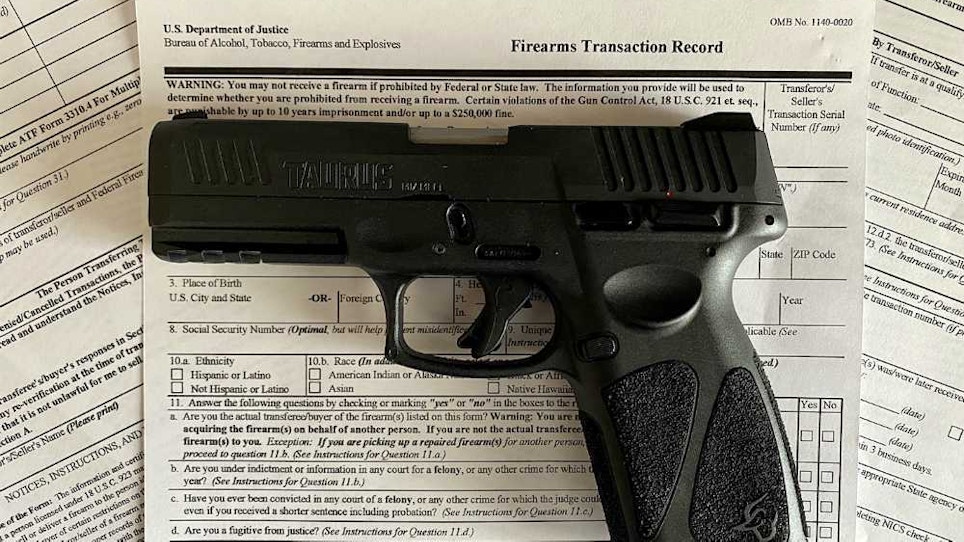Long lines, skyrocketing sales of guns and ammo, diminishing supplies and frustrations with background check delays are what NSSF is helping to navigate during the coronavirus pandemic.
Officials with the industry's trade organization said in an email alert it is in close contact with ATF to help get the answers businesses need at this critical time. Many firearm retailers are running low on Form 4473s and other required forms due to the substantial surge in sales.
ATF has informed the NSSF that it is currently limiting orders of ATF Form 4473s to 1,500 per request. ATF already has ordered additional forms and expects to receive them early next week. Also, ATF notes that as it replenishes its supply, it will reevaluate its limit on orders of the forms.
Print Your Own 4473 Copies?
If a firearm retailer does print photocopies of the Form 4473 to use during this time, it is important to print all six pages to remain compliant. This includes the instructions pages. In the past, retailers have been cited for not printing and filing all pages of Form 4473.
NSSF continues to work with ATF on guidance for retailers as to whether you are permitted to conduct curbside or sidewalk transactions during the national emergency. ATF lawyers are working on this issue and we should have more information on that front soon as well. We encourage FFLs to contact your local ATF Field Office to seek guidance in the meantime.
NSSF is also working to find out why FBI-NICS is telling FFLs they cannot transfer a firearm in a delayed transaction for several weeks (long past three business days) when it appears state offices are open.
Please continue to check NSSF’s COVID-19 Resources page for updates that will effect your business.
Some Companies Stepping Up To Help
Federal Ammunition has donated cases of N95 masks from its manufacturing inventory to help hospitals in its hometown of Anoka, Minnesota.
The N95 mask are widely used by medical professionals. The Centers for Disease Control says the N95 respirators and surgical masks are examples of personal protective equipment used to protect the wearer from airborne particles and from liquid contaminating the face.
Remington has offered to New York and federal officials its longtime Ilion, New York, production facility to assist in whatever way possible during the crisis. New York is on a "stay home" lockdown order, shuttering the plant where millions of shotguns and rifles were produced.
Now, Big Green officials have offered the plant to turn out medical supplies.
“The Remington plant in Ilion now has approximately one million square feet of unused and available manufacturing space,” said Ken D’Arcy, chief executive officer of Remington Arms in a March 23 letter to New York Gov. Andrew Cuomo and President Donald Trump.
“We would be honored to donate our facility to the production of ventilators, surgical masks, hospital beds or any other products mission-critical to the war on coronavirus.”
Remington began operations in 1816 in Ilion, a small community in central New York. Its main production facility is now in Huntsville, Alabama, where it moved in 2014.
Lawsuits About Gun Store Closures
The Second Amendment Foundation is working to help gun owners in states where state or city officials have closed gun and ammo stores or deemed them "non-essential."
SAF says The State of Delaware has backed away from closing gun shops during the current crisis. Instead, it has allowed sales but with qualifications. Revised language in the state’s emergency order says:
“Firearms dealers may conduct sales of firearms, ammunition, and other goods directly related to responsible firearm storage and maintenance, by appointment only. No more than two appointments per half hour shall occur, and sellers are limited to operating during normal working hours they operated on prior to the State of Emergency. Any seller who violates such directive may be subject to criminal prosecution or other civil enforcement remedies up to and including arrest or the involuntary closure of the business.”
“This is a great win for Delaware gun owners and the right to keep and bear arms,” said SAF founder and Executive Vice President Alan M. Gottlieb. “After we sued New Jersey, our threatened lawsuit against Delaware, in which we were partnering with our friends at the National Rifle Association and Firearms Policy Coalition played a key role in bringing about this change of heart.”
SAF is currently considering lawsuits against several jurisdictions over gun shop closures that were announced as part of executive orders that do not recognize gun and ammunition dealers and suppliers as “essential businesses.”
SAF is suing New Jersey Gov. Phil Murphy and State Police Supt. Patrick Callahan, asserting violation of civil rights under color of law due to shutdowns of firearms dealerships in the Garden State. Plaintiffs have also filed a show cause motion for a temporary restraining order and preliminary injunction.
What is Essential?
Confusion still exists about what defines "essential business" and whether firearms and ammo or sporting goods stores fall into those categories. Several states have enacted bans or qualified sales.
Texas Attorney General Ken Paxton issued a ruling that says the state's municipalities and counties may not use emergency powers to regulate or restrict the sale of firearms.
“State law provides several emergency powers to local governments to control movement within their region during a disaster, which serves our communities well during public health events like the one we’re fighting now. However, local regulation of the sale, possession, and ownership of firearms is specifically prohibited under Texas law,” said Attorney General Paxton. “Under our laws, every Texan retains their right to purchase and possess firearms.”
U.S. Department of Homeland Security's Cybersecurity & Infrastructure Security Agency has announced a coronavirus "guidance" to help identify the critical infrastructure industries in the country.
The agency worked with federal agencies and the private sector to identify the workers and businesses included in the list.






